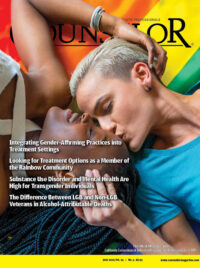When counseling a client, it is important for a counselor to also understand general cultural differences, especially sexual minorities because they are of all nationalities, ethnicities, and socioeconomic classes. Sexual minorities have been thrust into the national spotlight with several states passing the same sex marriage law. This group includes gay, lesbian, bisexual, transgender, and questioning (LGBTQ) people, who have had to fight oppression in addition to the attitudes of the majority.
When working with special populations such as the LGBTQ community, it is important to keep in mind that this population has been “in the closet,” so to speak, for a very long time. Many are just now getting the courage and strength to come “out of the closet.” When working with some LGBTQ clients, I have run into many different scenarios which I would like to share with you to help you on your journey to educate yourself on the population.
Many of the LGBTQ clients we have worked with have had to make up fake names for their partner or spouses so that they would be accepted by their families. They have had to introduce their girlfriend or boyfriend as a “friend,” when they are more than a friend. Think about it for a minute—put yourself in their shoes. Imagine your uncle or aunt just told you that there is going to be a huge family reunion in two weeks and to bring your significant other. However, your significant other is of the same sex. Now picture yourself going to the family reunion and while driving there having to come up with a name for your current same sex girlfriend or boyfriend that you have been dating for two or three years in fear that one of your family members might find out that you are gay or a lesbian and you’d be shunned from the whole family. Imagine yourself doing anything and everything to hide it, to fit in and be accepted because of your fear of being cut off from your family and friends just because you have a different sexual orientation.
Now changing gears, imagine getting kicked out of your house because your mother or father found out that you were gay or a lesbian. Imagine the feelings that you might have and think about how you would feel in that moment. A person that has taken care of you, nurtured you, loved you, and raised you, has now told you to get out and wants nothing to do with you. It sounds pretty harsh when the son or daughter only wants to be loved and supported. These are some, but not all scenarios that the LGBTQ population has to face.
Sexual minorities are now coming together to change the values, attitudes, and laws of society that discriminate against them. Many people who are sexual minorities do not identify themselves as such. Sexual minorities did not choose their sexual orientation, but their behavior relating to sex and lifestyle is a choice. The incidence of alcoholism and drug abuse is higher in the gay and lesbian community than it is in the general population. This large in part to self-image, treatment by friends and family who may not approve, and fear of rejection.
Discrimination against sexual minorities should be addressed in the same manner as discrimination against any other minority group. Counselors should avoid making sweeping generalizations about the behavior of sexual minorities, and should be aware of their own biases when working with this population. Many may feel threated or overfascinated with this population. Male counselors may feel threatened when counseling someone who has a same sex orientation. The male counselor may have countertransference because they believe acceptance of this culture threatens their masculinity and their sexual orientation; this is one reason that some heterosexual males may lash out and will act homophobic. It is important for counselors to work on their own personal issues of countertransference and biases before working with the sexual minority population. If a counselor is having difficulty working with this population, he or she should consult their clinical supervisor and seek supervision before supervision seeks them.
The LGBTQ community has struggled for years and the battle is only half over as there are men, women, and youth who are committing suicide every single day for not being accepted for who they are, in addition to being bullied because of their sexual orientation. This is the important part where we as counselors come in to help this population that has turned to drugs, food, gambling, and alcohol to numb their hurt and pain. It is important as a counselor to push past our bias—if we have any—while we are counseling the LGBTQ population and educate ourselves so that we can work with this population and not avoid them or refer them to other counselors or therapist because we do not know how to counsel them.
I challenge you to gain more knowledge to increase your awareness to counsel this special population that has been struggling for a very long time. CCAPP would like to personally invite you to the CCAPP Summer Symposium in Santa Clara, CA on June 27–28, 2015 at the Hyatt Regency to gain more knowledge on the subject. The conference will be focusing on cultural competence and special populations. We will show you ways to work with LGBTQ clients as well as with American Indians, African Americans, Latinos, Veterans, and many more groups.
Make sure to educate yourself as a counselor or therapist on the LGBTQ population so you are able to reach many more people and make a change to help in heal in someone’s life!












 Counselor Magazine is the official publication of the California Association of Addiction Programs and Professionals (CCAPP). Counselor offers online continuing education, article archives, subscription deals, and article submission guidelines. It has been serving the addiction field for more than thirty years.
Counselor Magazine is the official publication of the California Association of Addiction Programs and Professionals (CCAPP). Counselor offers online continuing education, article archives, subscription deals, and article submission guidelines. It has been serving the addiction field for more than thirty years.